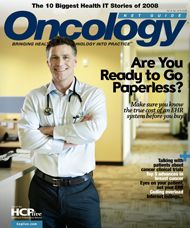Publication
Article
ONCNG Oncology
Opportunities and Challenges: A Time to Reflect at the End of a Busy Year
Author(s):
It is the final month of what has been economically a very tough year. Oncology centers and practices continue to face declining reimbursements on all service lines, and most have had either flat or lower revenues.
It is the final month of what has been economically a very tough year. Oncology centers and practices continue to face declining reimbursements on all service lines, and most have had either flat or lower revenues. Financial strife is a reality in this economy. Going forward, it is unclear what changes will emerge with the new Obama administration in 2009. Clearly, healthcare is a front-burner issue, and perhaps the Medicare program will be expanded to become “Americare.” Many private payers are reporting lower profitability. In the trenches, many hospitals reported declining profits in 2008.
Contributing further to the current gloomy outlook, the recently released Physicians’ Foundation survey of 12,000 physicians revealed:
• 94% of respondents said the time they devote to nonclinical paperwork has increased in the last three years.
• 63% stated that non-clinical paperwork led to less time spent with patients.
• Only 17% of physicians rated their practice’s financial position as “healthy and profitable” (62% of surveyed physicians were practice owners; 34% were solo practitioners).
Time spent on non-clinical issues continues to increase and put pressure on time with patients. More than ever, physicians are facing enormous challenges in their quest to find ways to deliver the best possible care at the lowest possible costs. I believe that the current economic environment will drive consolidation in the oncology space to gain efficiencies of size and scale and also for potential leverage with payers. Reimbursement models are starting to change with the advent of personalized medicine and the need to secure compensation for disease management and lower utilization of services.
One increasingly clear answer to many of the questions and challenges confronting modern practice can be found in the careful adoption of IT tools. Technology tools can help ease workflow pains while enhancing care and quality. IT is the major enabler of both doing more with less and being more effective. To derive maximum benefit, practices must ensure their IT tools do one (or more) of the following: enhance revenue cycle management, support disease management to help contract with payers, or help provide care with fewer staff.
Revenue cycle management has to be optimal in a business like ours with thinning margins. There is no room for major errors. This level of performance requires comprehensive, carefully implemented systems that support care delivery. There are many new tools from practice management systems vendors, claims clearing houses, and standalone remittance analyzers.
Accumulating sufficient capital to invest in IT is a major issue for clinical practices (especially the small- to mid-sized practices). It is possible that the Obama administration will allocate some funding to support financing EMR adoption; during the campaign, he talked about spending $50 billion over five years to promote the adoption of EMRs and other information technology. However, given the current financial and budget outlook, whether that will happen is anyone’s guess. It will most likely be necessary for providers, payers, and other groups to come together to really build the IT infrastructure deep enough to succeed at a high level of performance in this environment.
There is still time for your practice to make significant hardware and software investments by year end and still realize the tax benefits. This is also a time to reflect and refocus on the core value propositions for our patients and our organizations. We have an opportunity to come through these times retooled and more effective than ever before. Happy holidays, and see you in 2009!
Dr. Sharma is CEO of NextGen Oncology, a large oncology practice based in Dallas/Fort Worth, TX. He is also CEO of HealthIT, an Internet services company that supports the patient/provider network with technology solutions. Readers can visit www.jiveshsharma. com to learn more, and can e-mail Dr. Sharma at JSharma@ MyCancerCenter.com.
